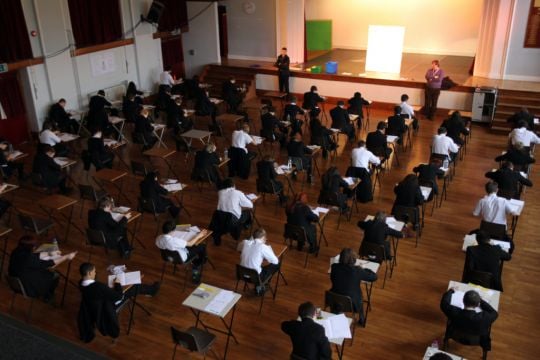Minister for Education Norma Foley has blamed a U-turn on splitting two senior State examinations on concerns raised about the pandemic’s effect on students.
Paper 1 of both the English and Irish written exams had been due to be held at the end of fifth year while the remaining Leaving Certificate exams are to be held at the end of sixth year as usual.
The changes had been due to come into effect from September following an announcement made by Ms Foley last March.
However, documents obtained by the Irish language group Conradh na Gaeilge showed the State Examinations Commission had raised concerns that holding the English essay exercise any earlier than the end of sixth year would significantly disadvantage boys given they mature more slowly than girls.
The recommendations announced by the minister were based on an advisory report by the National Council for Curriculum and Assessment, which recommended several Leaving Cert reforms, but did not include a recommendation to hold Paper 1 of English and Irish exams at the end of fifth year.
On Tuesday, the minister confirmed that students beginning fifth year in September this year will sit these exams at the end of sixth year, as had been the case in previous years.
“Key concerns outlined included that, given the significant disruption that students who will enter fifth year this September have experienced to their education as a result of the pandemic, this change should be deferred rather than being implemented in the coming school year,” she said.
“Having reflected on the views provided by stakeholders, I have decided to defer the introduction of this planned change so that those entering fifth year this coming September will sit both of the papers in each of the subjects in Irish and English in sixth year.”
In an interview on RTE, Ms Foley declined to clarify exactly where the policy originated.
The former teacher said the Leaving Cert applied programme already staggers exams over two years and that evidence had been heard repeatedly on the need to lessen the burden of assessment on students.
Despite those recommendations, Ms Foley said that as part of engagements, concerns have been raised about the impact of the Covid-19 pandemic on students, particularly the current cohort of Transition Year (TY) students.
“In terms of the paper ones at the end of fifth year for English and Irish, again, that was an interim measure distinct from Senior Cycle,” she said.
“I think there has been general agreement and consensus around the need to lessen the assessment load on students.
“We’ve heard this time and time again from the EU Committee on the rights of the child.
“The Joint Committee on Education held a number of hearings and, again, consistently coming through the hearings there was the need to lessen the load in terms of assessment.

“It has been brought to the fore by many of the partners in education in terms of the impact of Covid on the particular students, most notably the president TY students.”
She added: “Bearing in mind, I suppose, the wisdom from so many who were in the system recognising the need to spread the load of assessment, the step as an interim measure, as I say, distinct from Senior Cycle reform itself, but as the interim measure, (it) was proposed to move the paper ones – restructured, reimagined paper ones – at the end of fifth year.”
Labour TD and education spokesperson Aodhan O’Riordain welcomed the U-turn.
“This decision will be met with huge relief by many students, particularly those who were set to face into the unknown in September,” he said.
“One thing is certain, the Leaving Cert as an examination format is in desperate need of reform. People desperately want change to the current way of doing things, but this change must be brought in over a phased basis, with students and school communities having a fair chance to adapt to changes in the curriculum or exam format.”
Mr O’Riordain said that he would also push the Government to provide for a citizens’ assembly on the future of education.

On Tuesday, Minister Foley also announced the development of the Senior Cycle Redevelopment Programme Delivery Board and the Senior Cycle Redevelopment Partners’ Forum.
The Senior Cycle Redevelopment Programme Delivery Board will have responsibility for overseeing the Senior Cycle redevelopment work and it will report regularly to the minister on its progress.
It will be chaired by Dr Harold Hislop, former chief inspector of the Department of Education.







